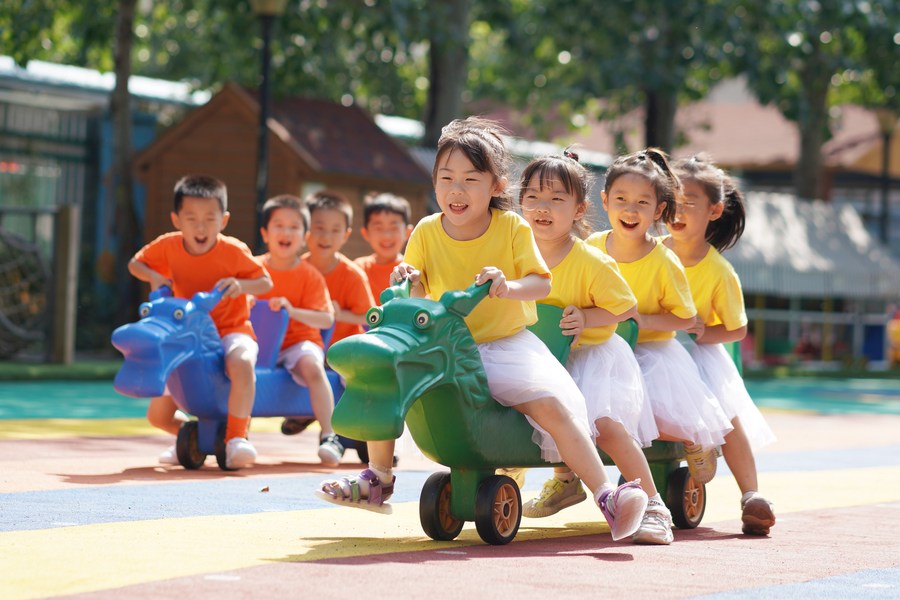China to push forward high-quality development of women and children's affairs

Children take part in a racing game at a kindergarten in Neiqiu County of Xingtai, north China's Hebei Province, June 10, 2021. [Photo by Liu Jidong/Xinhua]
BEIJING -- The State Council's executive meeting chaired by Premier Li Keqiang on Wednesday adopted the Outline for Women's Development in China (2021-2030) and the Outline for Children's Development in China (2021-2030), and required improving support measures for the three-child policy.
Gender equality and women's all-round development are important hallmarks of social progress, and children represent a country's future and a nation's hope. Recent years have seen notable achievements the country made in women and children's affairs.
"We must put high premium on work related to women and children as it is an important part of our modernization drive and a symbol for social progress. The principle of gender equality and putting children first should be better manifested in social life," Li said.
The two outlines set out objectives and measures in health, education, social security and welfare, family, environment, legislation and other areas, and made the following requirements. The basic state policy of gender equality must be delivered. Women's equal rights to education, employment, starting businesses, and participation in decision making and management must be protected. Equal remuneration for men and women for work of equal value will be fully implemented. Public services that support the comprehensive development of families and women will be expanded, and social security system improved to meet women's special needs. Basic support and services for women facing difficulties will be strengthened and the legal system protecting women's lawful rights and interests refined.
"There must be institutional arrangements to protect women's rights and interests. Competent departments must provide support," Li said.
The two outlines highlight the need to uphold the principle of putting children first. Greater emphasis must be given to the all-round protection of children at the family, school, society and the internet levels. Compulsory education will remain the top priority of education investment. Children's well-rounded development in terms of moral grounding, intellectual and physical ability, aesthetic sensibility, and work skills will be promoted.
The health services system for children must be enhanced to ensure the safety of food and products for children. The rights to survival, development and safety, and the interests of orphans, unattended children, children with disabilities and homeless children must be protected. Greater care and protection will be extended to left-behind children of migrant workers, and school bullying must be prevented and effectively dealt with.
"There are 250 million children in China. Their healthy development is of vital importance to families and the whole society," Li said. "We should focus our efforts on tackling the prominent issues that constrain the development of women and children's affairs."
The two outlines urged updating the support measures in executing the three-child policy. Maternity leave and childbirth allowance will be implemented, and parental leave explored. Public-benefit childcare services will be developed with the support of communities. Expenses for infant and child care services for children under 3 years old will be eligible for itemized extra tax deductions for individual income tax. Housing and other support policies will be strengthened. Multi-pronged steps will be taken to lighten the burden of family in child bearing, child care and children's education.
"Support measures for the three-child policy should be carefully studied, to steadily optimize the demographic mix and raise people's educational level," Li said.
























